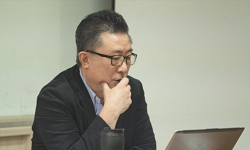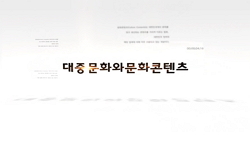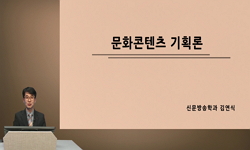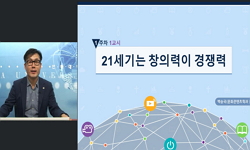Since the mid 1990s, there has been an international trend of neo-liberalism based on the logic of information and market competition around the world and the bailout crisis of the international Monetary Fund nationwide. Paradoxically, the popular use...
http://chineseinput.net/에서 pinyin(병음)방식으로 중국어를 변환할 수 있습니다.
변환된 중국어를 복사하여 사용하시면 됩니다.
- 中文 을 입력하시려면 zhongwen을 입력하시고 space를누르시면됩니다.
- 北京 을 입력하시려면 beijing을 입력하시고 space를 누르시면 됩니다.

역사민속콘텐츠의 창출 현황과 대중화의 과제 = The Status of Historical-Folklore Contents Creation and the Tasks of Popularization
한글로보기https://www.riss.kr/link?id=A105988803
- 저자
- 발행기관
- 학술지명
- 권호사항
-
발행연도
2018
-
작성언어
Korean
- 주제어
-
등재정보
KCI등재
-
자료형태
학술저널
- 발행기관 URL
-
수록면
7-22(16쪽)
-
KCI 피인용횟수
0
- DOI식별코드
- 제공처
-
0
상세조회 -
0
다운로드
부가정보
다국어 초록 (Multilingual Abstract)
Since the mid 1990s, there has been an international trend of neo-liberalism based on the logic of information and market competition around the world and the bailout crisis of the international Monetary Fund nationwide. Paradoxically, the popular use of historical-folklore contents was triggered as a part of efforts to overcome the ‘humanity crisis’ in the context of social pragmatism.
In order to analyze the trend of popularization of historical-folklore contents, it is necessary focus on the establishment of cultural contents infrastructure to utilize the history and culture of the traditional era.
For those businesses, there are 「Knowledge Information Resource management Project」 (Ministry of Information and Communication․National Information Society Agency, 1999~ ), 「The Cultural Resource Digital Contents Development Program」 (Ministry of Culture and Tourism․Korea Culture Contents Agency, 2002~ ), 「The Digital Local Culture Encyclopedia of Korea」 (The Academy of Korean Studies, 2004~ ).
The ‘Cultural Archetype Project’ which was proposed by the Korean Culture Contents Agency under Ministry of Culture and Tourism in 2002, to make use of digital technology and make it more competitive as a creative material for the development of the cultural industry, it became a catalyst for the creation of historical-folklore contents.
The field of historical-folklore contents need efforts to re-establish academic disciplines such as establishing scholarship, seeking methodology and theory. In order for the public to have high-quality contents, the university should produce outstanding individuals who can make the contents. In other words, it is necessary to develop a professional and systematic research education curriculum. The public’s perception on history is produced through contents such as movies, cartoons, or games and they perceive those contents as real historical fact. It can lead the public to understand wrong history. To correct this, it is the responsibility of historians to create a circumstances that emphasizes the importance of history when they produce historical-folklore contents. Additionally, they should continuously consider how to coexist excessive commercialization and pure academy.
The efforts to popularize historical-folklore contents will not only be limited to the revival of the humanities itself and the cultural contents industry, but also be a creative process that will create a new value orientation for the entire society and be an opportunity to create a new historical-folklore and humanities in the 21st century at the same time.
국문 초록 (Abstract)
1990년대 후반부터 정보화와 시장경쟁논리를 바탕으로 한 신자유주의라는 세계화의 동향과 국내적으로는 IMF의 구제금융 위기 속에서, 실용주의가 강조되는 상황이었다. 이러한 배경에서 ...
1990년대 후반부터 정보화와 시장경쟁논리를 바탕으로 한 신자유주의라는 세계화의 동향과 국내적으로는 IMF의 구제금융 위기 속에서, 실용주의가 강조되는 상황이었다. 이러한 배경에서 대학에서도 실용성이 떨어지는 학문단위의 구조조정이 시작되었다. 인문학 관련학과들이 통폐합되는 현실에서 이를 인문학 연구자들은 새로이 등장하는 문화콘텐츠분야에서 대안을 찾으려 하였고, 역사민속학계에서는 역사민속콘텐츠의 창출과 이의 대중적 활용에 주목하였다.
역사민속콘텐츠의 대중화 경향을 분석하기 위해서는 전통시대의 역사와 문화를 활용한 디지털 인프라 구축사업에 주목해야 한다. 대표적인 사업으로는 「지식정보자원관리사업」(과학기술정보통신부․한국정보문화진흥원, 1999년~ ), 「문화원형디지털콘텐츠화사업」(문화관광부․한국문화콘텐츠진흥원, 2002년~ ), 「한국향토문화전자대전사업」(한국학중앙연구원, 2004년~ ) 등이 있다.
2002년 2월에 문화관광부 출연기관인 한국문화콘텐츠진흥원에서 디지털 기술을 이용, 콘텐츠화하여 문화산업의 발전에 필요한 창작소재로 경쟁력을 높이고자 공모 제안한 ‘우리문화원형사업’이 역사민속콘텐츠의 본격적인 창출의 기폭제가 되었다.
역사민속콘텐츠 분야는 학문의 정립과 그와 관련된 방법론 및 교육론의 모색, 고증, 검토 등 학문을 재정립하기 위한 노력이 필요하다. 대중이 수준 높은 콘텐츠를 향유하기 위해서는 이를 제작하기 위한 인력을 대학에서 배출해야 할 것이다. 즉, 전문적이고 체계적인 연구 교육 교과과정의 개발이 필요하다는 것이다. 요즈음 대중의 역사 인식은 영화․게임․만화 등의 콘텐츠를 통해서 이루어지고 있고, 대중들은 이것을 실제의 역사 사실로 인식하기도 한다. 즉, 대중을 잘못된 역사 이해로 몰고 갈 수 있다. 이를 바로잡기 위해서는 역사민속콘텐츠의 제작에 있어서 역사의 고증을 중시하는 분위기로 만들어가는 것도 역사민속학 연구자들에게 주어진 책임이다. 또 순수학문과 지나친 상업화와의 관계를 어떻게 이룰 것인가에 대해 앞으로 계속 고민하며 풀어야 할 과제이다.
참고문헌 (Reference)
1 박경하, "한국의 문화원형 콘텐츠 개발 현황과 과제" 인문콘텐츠학회 3 : 2004
2 김기덕, "한국사의 대중화 경향과 과제-한국사 저작물을 중심으로" 중앙대학교 중앙사학연구소 (10․11) : 1998
3 주성지, "한국 고대사 관련 디지털 역사자료 구축의 성과와 과제" 한국고대사학회 (84) : 27-74, 2016
4 김기덕, "정보화시대의 역사학 : ‘映像歷史學’을 제창한다" 역사교육연구회 75 : 2000
5 박경하, "영상기록 현황과 역사민속학에서의 활용" 한국역사민속학회 14 : 43-54, 2002
6 오종록, "역사학의 전문성과 대중성" 한국학중앙연구원 22 (22): 1999
7 오항녕, "역사 대중화와 역사학 - 역사의 향유와 모독사이 -" 한국역사연구회 (100) : 91-128, 2016
8 이남희, "문화콘텐츠 입문" 북코리아 2006
9 서재석, "디지털시대의 역사 읽기, TV의 역사 대중화" 역사비평사 57 : 2001
10 주성지, "디지털 역사자료의 구축과 표준" 한국역사민속학회 (26) : 209-246, 2008
1 박경하, "한국의 문화원형 콘텐츠 개발 현황과 과제" 인문콘텐츠학회 3 : 2004
2 김기덕, "한국사의 대중화 경향과 과제-한국사 저작물을 중심으로" 중앙대학교 중앙사학연구소 (10․11) : 1998
3 주성지, "한국 고대사 관련 디지털 역사자료 구축의 성과와 과제" 한국고대사학회 (84) : 27-74, 2016
4 김기덕, "정보화시대의 역사학 : ‘映像歷史學’을 제창한다" 역사교육연구회 75 : 2000
5 박경하, "영상기록 현황과 역사민속학에서의 활용" 한국역사민속학회 14 : 43-54, 2002
6 오종록, "역사학의 전문성과 대중성" 한국학중앙연구원 22 (22): 1999
7 오항녕, "역사 대중화와 역사학 - 역사의 향유와 모독사이 -" 한국역사연구회 (100) : 91-128, 2016
8 이남희, "문화콘텐츠 입문" 북코리아 2006
9 서재석, "디지털시대의 역사 읽기, TV의 역사 대중화" 역사비평사 57 : 2001
10 주성지, "디지털 역사자료의 구축과 표준" 한국역사민속학회 (26) : 209-246, 2008
11 권중달, "韓國에서의 歷史智識의 大衆的 擴散" 중앙대학교 중앙사학연구소 (10․11) : 1998
12 "http://www.koreanhistory.or.kr/"
13 "http://www.grandculture.net/"
14 "http://www.culturecontent.com/main.do"
15 문화관광부, "2002년 우리 문화원형의 디지털콘텐츠화사업 공모 사업안내서"
동일학술지(권/호) 다른 논문
-
- 한국역사민속학회
- 이필영
- 2018
- KCI등재
-
갑오개혁기 경무청 경무관의 임용과 승진의 근대적 경험-『大韓帝國官員履歷書』에 등재된 경무관 이력을 중심으로-
- 한국역사민속학회
- 차인배
- 2018
- KCI등재
-
서양 선교사가 주도한 근대 한국학의 발명과 국제화, 1870년대-1890년대
- 한국역사민속학회
- 육영수
- 2018
- KCI등재
-
- 한국역사민속학회
- MACHIDATAKASHI
- 2018
- KCI등재
분석정보
인용정보 인용지수 설명보기
학술지 이력
| 연월일 | 이력구분 | 이력상세 | 등재구분 |
|---|---|---|---|
| 2026 | 평가예정 | 재인증평가 신청대상 (재인증) | |
| 2020-01-01 | 평가 | 등재학술지 유지 (재인증) |  |
| 2019-12-31 | 학술지명변경 | 외국어명 : The Journal of Korean Historical-forklife -> The Journal of Korean Historical-folklife |  |
| 2017-01-01 | 평가 | 등재학술지 유지 (계속평가) |  |
| 2013-01-01 | 평가 | 등재학술지 유지 (등재유지) |  |
| 2010-01-01 | 평가 | 등재학술지 유지 (등재유지) |  |
| 2008-01-01 | 평가 | 등재학술지 유지 (등재유지) |  |
| 2005-01-01 | 평가 | 등재학술지 선정 (등재후보2차) |  |
| 2004-01-01 | 평가 | 등재후보 1차 PASS (등재후보1차) |  |
| 2002-01-01 | 평가 | 등재후보학술지 선정 (신규평가) |  |
학술지 인용정보
| 기준연도 | WOS-KCI 통합IF(2년) | KCIF(2년) | KCIF(3년) |
|---|---|---|---|
| 2016 | 0.63 | 0.63 | 0.65 |
| KCIF(4년) | KCIF(5년) | 중심성지수(3년) | 즉시성지수 |
| 0.68 | 0.66 | 1.486 | 0.06 |





 DBpia
DBpia






